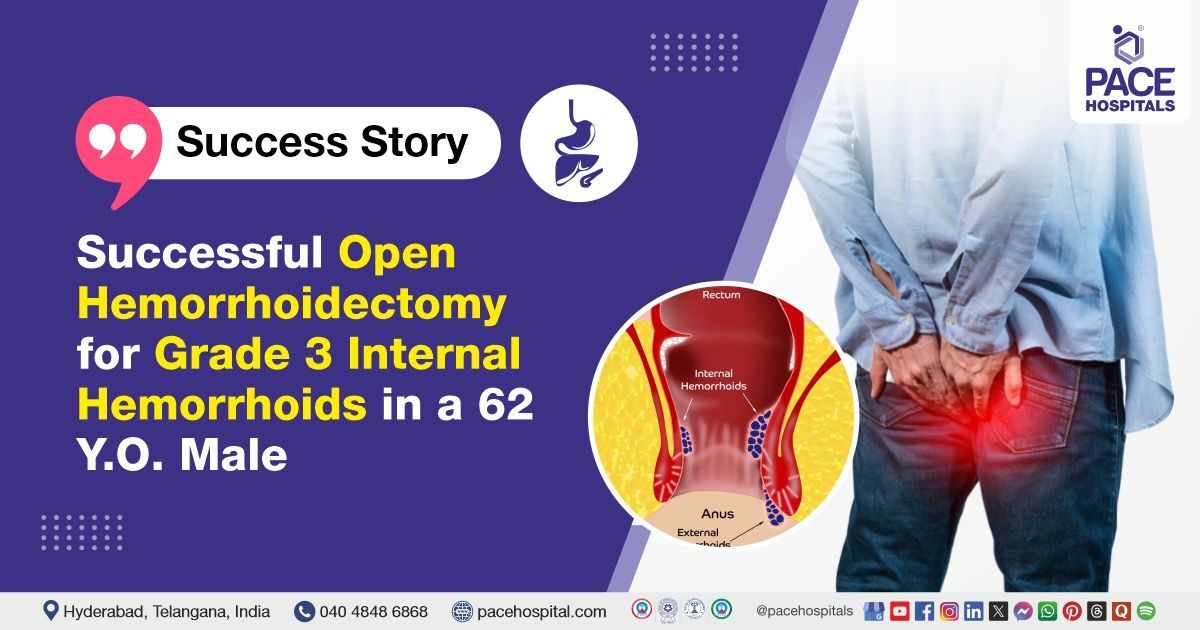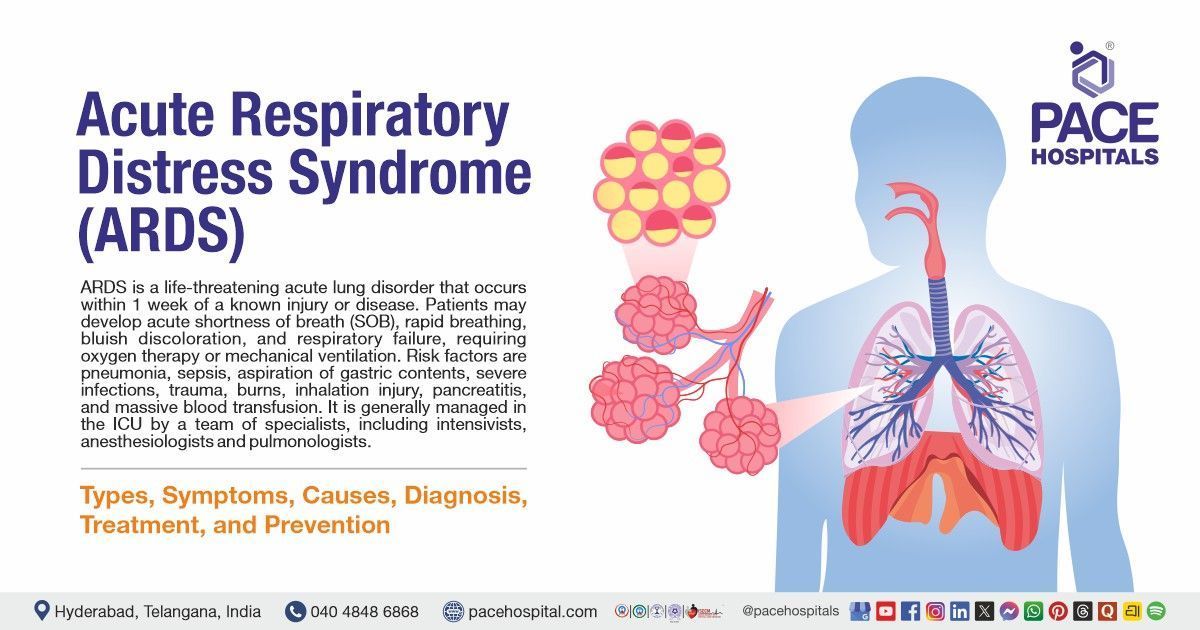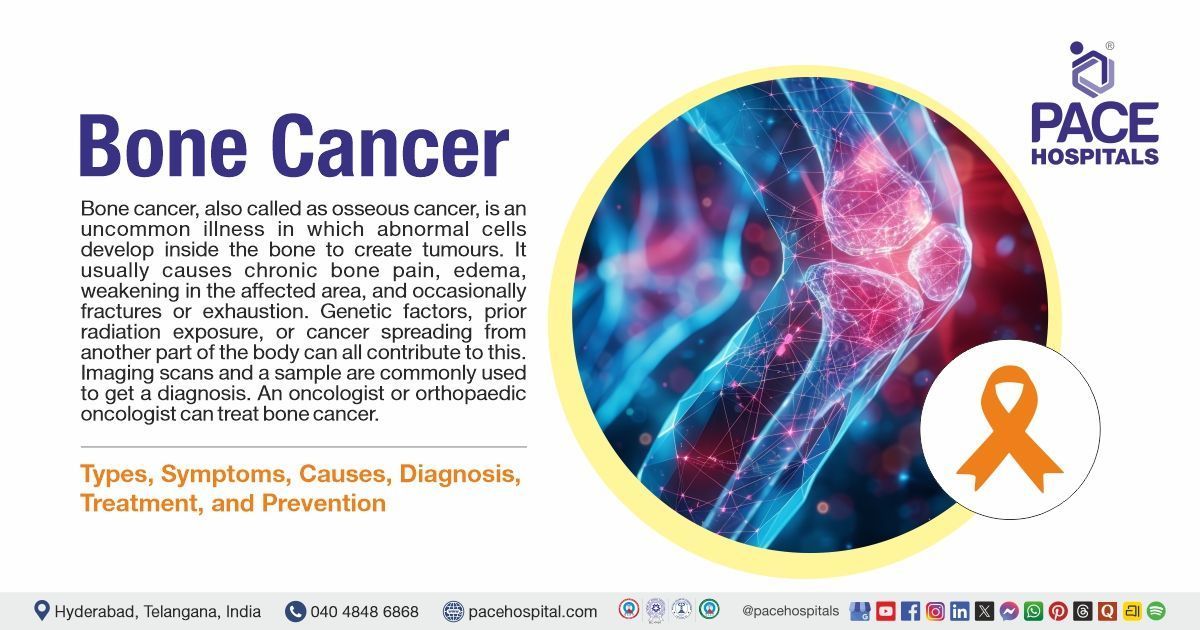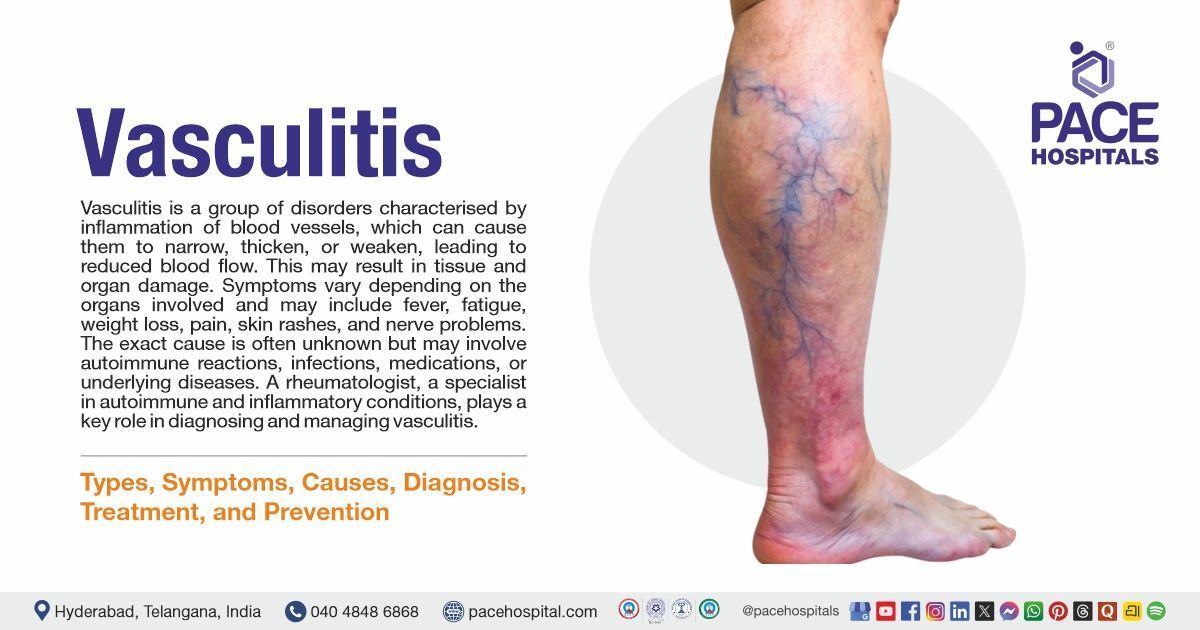Successful Open Hemorrhoidectomy for Grade 3 Internal Hemorrhoids in a 62 Y.O. Male
PACE Hospitals
PACE Hospitals’ expert Surgical Gastroenterology team successfully performed an Open Hemorrhoidectomy on a 62-year-old male patient diagnosed with grade 3 prolapsing internal hemorrhoids. The procedure aimed to surgically remove the enlarged and prolapsed hemorrhoidal tissue, relieve symptoms such as bleeding and discomfort, and prevent further complications.
Chief Complaints
A 62-year-old male patient with a
body mass index (BMI) of 21 presented to the Surgical Gastroenterology Department at
PACE Hospitals, Hitech City, Hyderabad, with a two-year history of constipation and a prolapsing rectal mass during defecation. Initially, the patient experienced pain during defecation, which later subsided. He also reported the need to manually reduce the prolapsed mass after each bowel movement.
Past Medical History
The patient is a known case of
hypothyroidism and is under regular treatment.
On Examination
On examination, the patient was conscious, coherent, and oriented to time, place, and person. He appeared to be in a stable general condition. Systemic examination revealed normal findings, with no abnormalities detected in the cardiovascular, respiratory, or neurological systems. The abdomen was soft and non-tender, with normal bowel sounds and no signs of organomegaly. Per rectal examination revealed large, prolapsing internal hemorrhoids at the 3, 6, and 10 o’clock positions. There were no signs of active bleeding, fissures, or fistulas. The anal sphincter tone was normal, and the rectal mucosa appeared healthy.
Diagnosis
Upon admission, the patient underwent a comprehensive clinical evaluation, along with a detailed review of his prior medical history and presenting symptoms by the Surgical Gastroenterology team.
To support the clinical findings, laboratory and diagnostic investigations were performed as part of the preoperative assessment. The complete blood count (CBC) was within normal limits, with no signs of anemia or infection. Liver function tests (LFTs), renal function tests (RFTs), and serum electrolytes were all within normal ranges, indicating preserved hepatic and renal function. Coagulation parameters, including PT, INR, and APTT, were normal, suggesting no increased risk of perioperative bleeding.
A digital rectal examination and proctoscopic evaluation revealed large, prolapsing internal hemorrhoids at the 3, 6, and 10 o’clock positions, consistent with Grade 3 internal hemorrhoids. These findings were further supported by the patient’s clinical history of a rectal mass during defecation that required manual reduction, along with long-standing constipation.
Based on the confirmed diagnosis, the patient was advised to undergo Hemorrhoids Treatment in Hyderabad, under the expert care of the surgical Gastroenterology Department.
Medical Decision Making
After a detailed consultation with Dr. Suresh Kumar S, a Surgical Gastroenterologist, a comprehensive evaluation was conducted to determine the most appropriate diagnostic and therapeutic approach. Considering the patient’s presentation with grade 3 prolapsing internal hemorrhoids, complaints of constipation, and the need for manual reduction of the prolapsed tissue, the team assessed the severity of the condition and potential complications such as persistent bleeding, discomfort, and risk of progression.
Further clinical examination and diagnostic assessments confirmed the diagnosis of grade 3 prolapsing internal hemorrhoids involving the 3, 6, and 10 o’clock positions. It was determined that open hemorrhoidectomy was identified as the most effective surgical approach to remove the prolapsed hemorrhoidal tissue, relieve symptoms, and prevent recurrence or further complications.
The patient and his family were informed about the severity of the condition, the surgical procedure, its associated risks, and the expected outcomes, including symptomatic relief and improved quality of life.
Surgical Procedure
Following the decision, the patient was scheduled to undergo Open Hemorrhoidectomy Surgery in Hyderabad at PACE Hospitals, under the supervision of an expert in the Surgical Gastroenterology Department.
The following steps were carried out during the procedure:
Preoperative Preparation and Anesthesia: After obtaining informed consent, the patient was positioned in the lithotomy or prone jackknife position under appropriate anesthesia (general or regional). The perianal area was cleaned and draped in a sterile fashion.
Identification and Exposure of Hemorrhoidal Tissue: Using a suitable anal retractor, the anal canal and hemorrhoidal cushions at the 3, 6, and 10 o’clock positions were carefully inspected. The large prolapsing Grade 3 internal hemorrhoids were identified and isolated for excision.
Excision of Hemorrhoidal Tissue: The hemorrhoidal tissue was excised using sharp dissection. The mucocutaneous bridges between the hemorrhoids were preserved to maintain anal canal integrity and continence. Care was taken to control bleeding by ligation or cauterization of hemorrhoidal vessels during the excision.
Recto-Anal Repair: After excision, the wound at the 6 o’clock position was repaired to restore the anatomical structure of the anal canal and minimize postoperative complications such as stenosis or bleeding.
Hemostasis and Dressing: Complete hemostasis was achieved, and the surgical site was thoroughly irrigated. The wound was left open to heal by secondary intention (typical of open hemorrhoidectomy). A moist gauze dressing was applied, and the patient was monitored postoperatively for recovery.
Postoperative Care
The procedure was uneventful, and the patient’s postoperative recovery was satisfactory. During the hospital stay, the patient was treated with intravenous fluids, intravenous antibiotics, and other supportive medications. He was discharged in a hemodynamically stable condition with appropriate discharge instructions.
Discharge Medications
The patient was prescribed a course of antibiotics to prevent postoperative infections. Analgesics were provided to manage pain during the recovery period. Proton pump inhibitors were administered to protect the gastrointestinal mucosa. Stool softeners and laxatives were given to facilitate smooth bowel movements and prevent straining. Supportive supplements were also included to aid liver function and overall health.
Advice on Discharge
The patient was advised to take sitz baths twice daily using either Epsom salt or a 5% betadine solution, prepared by adding two tablespoons of Epsom salt or 5 ml of betadine to water. Proper wound care was emphasized, and the patient was instructed to continue with the previously prescribed medications.
Emergency Care
The patient was informed to contact the emergency ward at PACE Hospitals in case of any emergency or development of symptoms such as fever, abdominal pain, bleeding and vomiting.
Review and Follow-up Notes
The patient was advised to return for a follow-up visit with the Surgical Gastroenterologist in Hyderabad at PACE Hospitals, after 5 days for further evaluation.
Conclusion
This case highlights the successful management of grade 3 prolapsing internal hemorrhoids through open hemorrhoidectomy. Early diagnosis and appropriate surgical intervention led to satisfactory postoperative recovery without complications. Comprehensive perioperative care, including pain management and wound care, contributed to the patient’s improved quality of life.
Open Hemorrhoidectomy – The Expertise of a Surgical Gastroenterologist in Managing Complex Hemorrhoidal Disease
This case exemplifies how the specialized skills of a surgical gastroenterologist / surgical gastroenterology doctor can elevate the standard of care in managing advanced hemorrhoidal disease. Faced with grade 3 prolapsing internal hemorrhoids causing significant symptoms, the surgical team performed an open hemorrhoidectomy combined with recto-anal repair—a precise surgical intervention requiring detailed anatomical knowledge and expert technique. The ability to effectively excise the hemorrhoidal tissue while preserving anal function highlights the advanced capabilities involved in achieving optimal patient outcomes with minimal complications. This reinforces the crucial and evolving role of surgical expertise in treating complex anorectal disorders with precision and innovation.
Share on
Request an appointment
Fill in the appointment form or call us instantly to book a confirmed appointment with our super specialist at 04048486868











